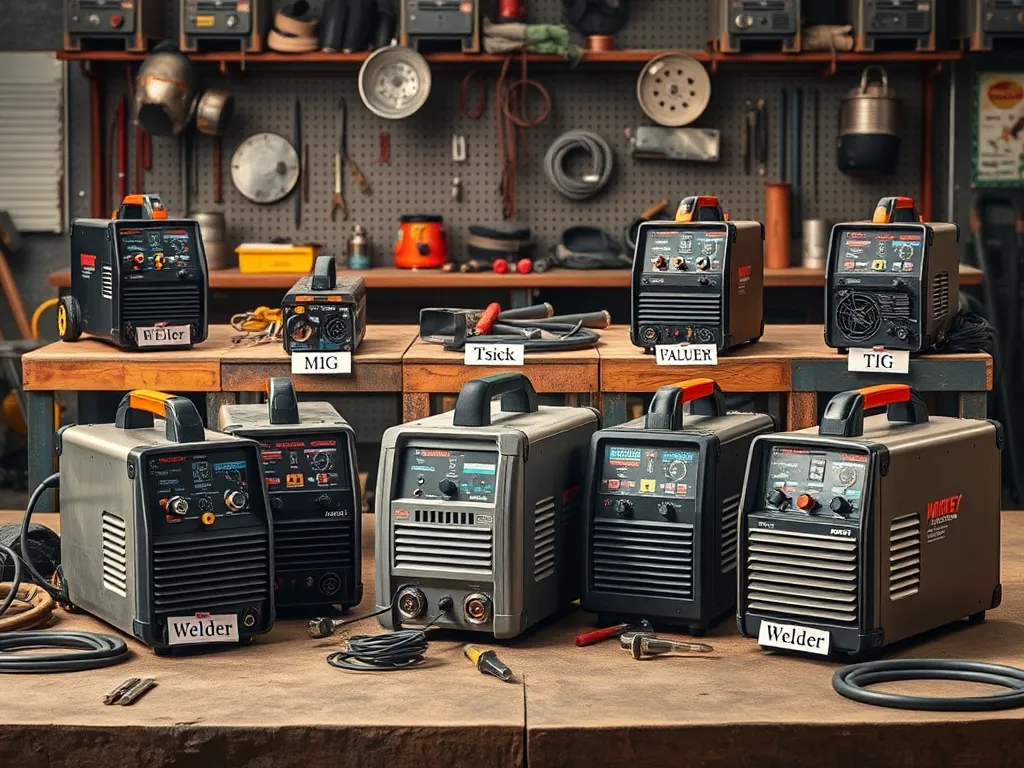
The Top Picks for a Good Starter Welder
If you're new to welding and looking for a good starter welder, it's important to choose a machine that is reliable, easy to use, and offers good performance. Welding can be a challenging skill to master, but with the right equipment, you'll be well on your way to becoming a proficient welder. In this article, we'll explore the top options for a good starter welder, discuss the different types of welders available, highlight important features to consider, recommend some trusted brands, provide tips for beginners, and suggest budget-friendly options.
If you've been searching for the ideal starter tool for your welding needs, a good starter welder can prove to be a wise investment. This tool will assist you as you embark on your first welding projects. You can acquire a thorough understanding of the top welders suitable for beginners by visiting this guide by Mohamed I. Qoquf .
Before diving into the specific models, let's take a closer look at the different types of welders available in the market. There are three main types: arc welders, MIG welders, and TIG welders. Each type has its own advantages and best-suited applications.
Arc welders, also known as stick welders, are a popular choice for beginners due to their affordability and versatility. They use a simple electrode to create an electric arc between the electrode and the workpiece, resulting in a strong weld. Arc welders are suitable for a wide range of materials and can handle thicker metal.
MIG welders, or Metal Inert Gas welders, are known for their ease of use and ability to weld a variety of materials. They utilize a wire electrode that is continuously fed through a welding gun, while a shielding gas protects the weld from contamination. MIG welding is fast and efficient, making it a great choice for beginners and DIY enthusiasts.
TIG welders, or Tungsten Inert Gas welders, are highly precise and deliver high-quality welds. They use a tungsten electrode to create the electric arc, while a separate filler metal is manually added to the weld pool. TIG welding requires more skill and practice compared to other types but offers excellent control over the welding process.
Types of Welders
Arc welders, also known as stick welders, are a popular choice for beginners due to their affordability and versatility. They use a simple electrode to create an electric arc between the electrode and the workpiece, resulting in a strong weld. Arc welders are suitable for a wide range of materials and can handle thicker metal.
MIG welders, or Metal Inert Gas welders, are known for their ease of use and ability to weld a variety of materials. They utilize a wire electrode that is continuously fed through a welding gun, while a shielding gas protects the weld from contamination. MIG welding is fast and efficient, making it a great choice for beginners and DIY enthusiasts.
TIG welders, or Tungsten Inert Gas welders, are highly precise and deliver high-quality welds. They use a tungsten electrode to create the electric arc, while a separate filler metal is manually added to the weld pool. TIG welding requires more skill and practice compared to other types but offers excellent control over the welding process.
Features to Consider
Blending practicality with ease of use, the most suitable starter welder can become your trustworthy sidekick as you delve into the welding industry. In fact, selecting a high-quality starter welder can set a solid foundation for your future projects. For a comprehensive insight on this topic, do not hesitate to consult Mohamed I. Qoquf’s informative article on LinkedIn.
When choosing a good starter welder, there are several important features to consider. One of the key features is power output. The power output determines the welding capability of the machine, with higher output machines able to handle thicker materials. It's important to choose a welder with sufficient power output for your intended applications.
Another crucial feature to consider is the duty cycle. The duty cycle indicates the amount of time a welder can operate continuously before needing to cool down. A higher duty cycle means longer welding times, which is especially important for larger projects. Look for a welder with a duty cycle that suits your needs.
Portability is also an important factor, especially if you plan to take your welder to different job sites. Look for a welder that is compact and lightweight, with a carrying handle or wheels for easy transportation.
Ease of use is vital for beginners. Look for a welder with intuitive controls and a clear display. Some welders even come with built-in welding guides and presets to help you get started quickly.
Safety features should not be overlooked. Look for welders with features like thermal overload protection, voltage fluctuations protection, and a grounded power cord. It's important to prioritize your safety while welding.
Recommended Brands
When it comes to welding machines, there are several trusted brands that consistently deliver high-quality products. One such brand is Lincoln Electric. Known for their reliability and performance, Lincoln Electric offers a wide range of welders suitable for beginners. Their machines are built to last and provide excellent welding results.
Hobart is another reputable brand in the welding industry. They are known for producing durable and user-friendly welders. Hobart welders are designed for both professionals and beginners, making them a great choice for a good starter welder.
Miller Electric is a well-known brand that offers a range of welders catering to different skill levels. Their welders are known for their versatility, performance, and durability. Miller Electric welders are often favored by professional welders but are also suitable for beginners.
Tips for Beginners
Are you ready to make the leap into welding? Initiating this journey with a dependable, beginner-friendly welder will definitely be a game-changer. Understand the nuts and bolts of welding tools best suited for beginners via this informative piece by Mohamed I. Qoquf. Start your welding adventure on the right foot today!
If you're new to welding, here are some tips to help you get started:
Perhaps you want to venture into the world of welding, and you're looking at getting a good entry-level welder to kickstart your journey . Come across as a professional right from the start with the best welding tools on the market, which you can discover right here in Mohamaed I. Qoquf’s guide.
Learn proper welding techniques: Take the time to learn and practice the correct welding techniques. This will ensure strong and high-quality welds.
Welding can appear daunting for the uninitiated, but with a robust welder suitable for first-time users , the process becomes considerably less intimidating. Take the plunge and learn all about the top-rated welders for beginners in this expert recommendation by Mohamed I. Qoquf.
Practice on scrap metal: Before working on your actual project, practice on scrap metal to get comfortable with the welding process and settings.
Wear appropriate safety gear: Always wear a welding helmet, gloves, and protective clothing to protect yourself from sparks, UV radiation, and hot metal.
Take a welding course: Consider taking a welding course or attending workshops to learn from experienced welders. This will fast-track your learning and help you gain valuable hands-on experience.
Budget-Friendly Options
Forney Easy Weld 100 ST is an excellent budget-friendly option for beginners. It is a compact and lightweight stick welder that offers reliable performance for small welding tasks.
Hobart Handler 140 is a versatile MIG welder that is suitable for beginners and DIY enthusiasts. It offers easy setup, smooth welding, and excellent value for the price.
Lincoln Electric K2185-1 Handy MIG Welder is a portable and user-friendly MIG welder that is ideal for beginners. It provides precise control and can handle a variety of materials.
